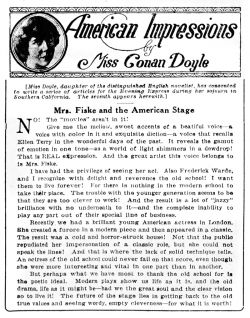Mrs. Fiske and the American Stage
| << The Influence of the Movies #6 | American Impressions | #8 Tradition in the West >> |
Mrs. Fiske and the American Stage is the seventh article of the series American Impressions by Miss Conan Doyle written by Mary Conan Doyle, the first daughter of Arthur Conan Doyle, in the Los Angeles Evening Express on 5 june 1920.
Mrs. Fiske and the American Stage

(5 june 1920, p. 31)
[Miss Doyle, daughter of the distinguished English novelist, has consented to write a series of articles for the Evening Express during her sojourn in Southern California. The seventh appears herewith.]
No! The "movies" aren't in it!
Give me the mellow, sweet accents of a beatiful voice — a voice with color in it and exquisite diction — a voice that recalls Ellen Terry in the wonderful days of the past. It reveals the gamut of emotion in one tone — as a world of light shimmers in a dewdrop! That is REAL expression. And the great artist this voice belongs to is Mrs. Fiske.
I have had the privilege of seeing her act. Also Frederick Warde, and I recognize with delight and reverence the old school! I want them to live forever! For there is nothing in the modern school to take their place. The trouble with the younger generation seems to be that they are too clever to work! And the result is a lot of "jazzy" brilliance with no underneath to it — and the complete inability to play any part out of their special line of business.
Recently we had a brilliant young American actress in London. She created a furore in a modern piece and then appeared in a classic. The result was a cold and horror-struck house! Not that the public repudiated her impersonation of a classic role, but she could not speak the lines! And that is where the lack of solid technique tells. An actress of the old school could never fail on that score, even though she were more interesting and vital in one part than in another.
But perhaps what we have most to thank the old school for is the poetic ideal. Modern plays show us life as it is, and the old drama, life as it might be — had we the great soul and the clear vision so to live it! The future of the stage lies in getting back to the old true values and seeing wordy, empty cleverness — for what it is worth!